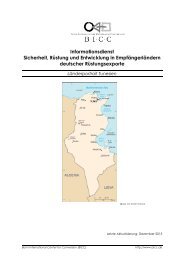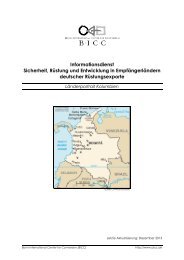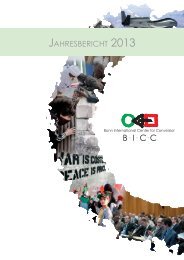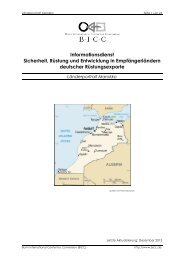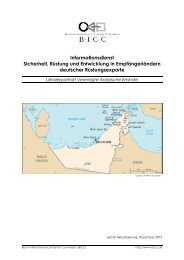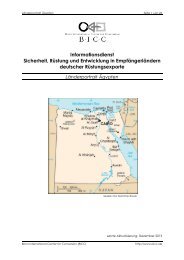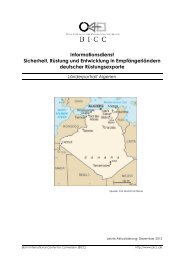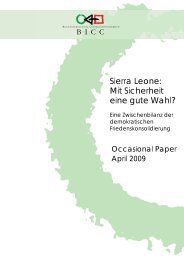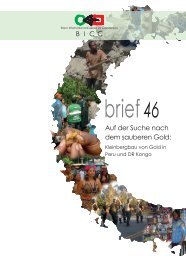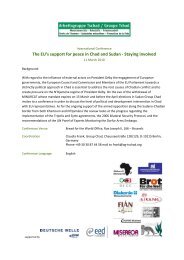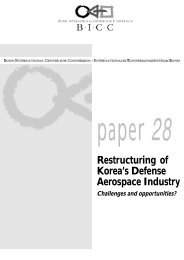English - BICC
English - BICC
English - BICC
Create successful ePaper yourself
Turn your PDF publications into a flip-book with our unique Google optimized e-Paper software.
that this would inflame Nationalist and<br />
Republican sentiment; neither was it a<br />
provision of the Agreement. Its main<br />
purpose was to buy time and placate<br />
Unionist feeling before the referenda<br />
and elections to an Assembly. Blair<br />
sought to further soothe Unionist<br />
feeling over the lack of<br />
decommissioning by setting up a list of<br />
criteria with which to judge the<br />
sincerity of paramilitary-linked parties<br />
to the Agreement in “an objective,<br />
meaningful and verifiable way” (Irish<br />
Times, 15 May 2000). These included an<br />
unequivocal statement that the “so<br />
called war is finished”, an end to<br />
targeting, surveillance and paramilitary<br />
beatings, the “progressive<br />
abandonment and dismantling of<br />
paramilitary structures”, full<br />
cooperation with the IICD and a<br />
commitment that no other<br />
organisations would be used as proxies<br />
for violence (Irish Times, 15 May 2000).<br />
Declarations like this bought time for<br />
pro-Agreement Unionism, and partially<br />
balanced the difficulties Unionists had<br />
felt in signing up to an Agreement void<br />
of any practical disarmament. What<br />
they did not do was bring a structured<br />
approach to the solving of the<br />
problem. Perhaps one did not appear<br />
possible. The IRA did not wish to<br />
decommission and felt no pressing<br />
need to, as it was not a signatory to the<br />
Agreement. On the other hand,<br />
Unionists demanded its disarmament.<br />
The genius of the Agreement, indeed<br />
of the peace process itself, had lain in<br />
the use of vague language which the<br />
various parties could mould into their<br />
own image, thus allowing both sides to<br />
claim victory, or at least honourable<br />
compromise. Disarmament is neither<br />
an abstract concept nor a woolly form<br />
of words, to be endlessly parsed and<br />
interpreted. Disarmament exists in the<br />
concrete world of gunmetal and<br />
cordite, and as such, has proved<br />
difficult for the politics of the peace<br />
process to digest. Yet upon it rests the<br />
success of the Agreement.<br />
British strategies,<br />
1996–1998<br />
During the tenure of the Conservative<br />
government, a gradual erosion took<br />
place in their insistence on<br />
decommissioning prior to negotiations.<br />
Indeed the dropping of the precondition<br />
began to become apparent in<br />
late February of 1996. Statements from<br />
the government had become even<br />
more explicit by November of that<br />
year and it seemed clear that prior<br />
decommissioning would not be<br />
required to gain entry into talks.<br />
However, sceptics felt it more accurate<br />
to say that the decommissioning precondition<br />
had simply moved from the<br />
entrance way to somewhere behind the<br />
front door. Major may have stipulated<br />
that the only qualification for entry to<br />
negotiations (aside from subscription<br />
to the Mitchell Principles) was the<br />
unequivocal maintenance of a<br />
ceasefire, but it was clear that, within<br />
talks, decommissioning would feature<br />
prominently and that substantive<br />
negotiations could not begin without<br />
all-party agreement on the issue.<br />
The British plan was to set up an allparty<br />
committee at the negotiations to<br />
review the problem of<br />
decommissioning, and only when there<br />
was agreement on how to take the<br />
matter forward could the parties move<br />
beyond the opening plenary session.<br />
Thus the weapons issue was not to be<br />
easily separated from all-party<br />
negotiations (Irish Times, 18 May 1996).<br />
As John Wheeler, the security minister<br />
for Northern Ireland stated, the<br />
commitment to decommissioning was<br />
the most important of the many “keys<br />
on the key ring” that would unlock the<br />
door to peace (Irish Times, 14 June<br />
1996). Major had claimed that<br />
decommissioning need not prove a<br />
“stumbling block” in negotiations, but<br />
it appeared to Republicans that<br />
excessive focus would be given to it<br />
and that it would soon re-emerge as a<br />
blocking mechanism.<br />
B·I·C·C<br />
run-up to the agreement<br />
The incoming Labour government<br />
approached the question of<br />
decommissioning with a sense of<br />
urgency and flexibility not seen in the<br />
previous administration’s handling of<br />
the matter. Getting inclusive talks<br />
started was seen as the overwhelming<br />
priority. This new tone was given a<br />
more concrete form as the Labour<br />
administration explicitly removed<br />
decommissioning as a pre-condition<br />
within talks. Decommissioning was<br />
certainly to be discussed within the<br />
talks but there was to be no<br />
requirement for it to occur and this<br />
realignment of policy secured a<br />
reinstatement of the IRA ceasefire.<br />
Rather than being placed as a central<br />
focus of the negotiations, the creation<br />
of certain structures enabled<br />
disarmament to be set to one side.<br />
Institutionalisation of the<br />
decommissioning question in the form<br />
of the IICD and the subcommittee on<br />
decommissioning, allowed the issue to<br />
be effectively compressed into a rather<br />
lonely fourth strand of the<br />
negotiations. Whilst the DUP and the<br />
UKUP (United Kingdom Unionist<br />
Party) balked at negotiations with Sinn<br />
Fein without decommissioning, the<br />
institutionalisation of the issue at least<br />
provided cover for Ulster Unionists,<br />
who could feel reassured that<br />
decommissioning was not going to be<br />
pushed away for long, given the<br />
creation of specific structures to deal<br />
with it. The benefits of<br />
institutionalisation for Republicans<br />
were seen in the compression of the<br />
issue into discreet fora, which enabled<br />
substantive negotiations to progress<br />
without fear of blockage.<br />
At times, the new government would<br />
apply pressure to Sinn Fein; Blair<br />
warned Republicans that he would<br />
move the process ahead without them<br />
if they dithered on the calling of a<br />
ceasefire (Irish Times, 23 June 1997).<br />
This threat of being left out in the<br />
political cold was applied to Unionists<br />
in more surreptitious fashion a few<br />
weeks later; it was asserted that the two<br />
governments would pursue “rapid<br />
27



